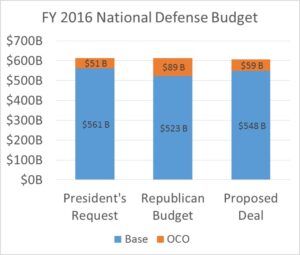Budget Deal Saves The Day For Defense – If It Passes
Posted on

WASHINGTON: The budget deal announced late last night is unmixed good news for the Defense Department, our sources say — for a year, at least, and if it actually passes the ever-more-erratic House of Representatives.
“This ‘October Surprise’ is a better deal for defense than I expected,” said one of Washington’s leading budget experts, Todd Harrison, now at the Center for Strategic and International Studies. “It would increase the overall national defense base budget by $25 billion and add an extra $8 billion in OCO [overseas contingency operations] funding for FY16. That puts total national defense (base + OCO) at $607 billion, which is just $5 billion short of what the President requested — [but] the relief for FY17 is a bit less: $15 billion increase in the budget cap and about the same in OCO.”

Graphic courtesy Todd Harrison (CSIS)
It was what President Obama considered the overuse of OCO to bypass the Budget Control Act caps that led him to veto the National Defense Authorization Act. If the budget deal passes, it looks like the NDAA can be easily tweaked to reflect the reduced budget numbers and sent back to Obama.
“The deal is also much closer to the President’s proposed budget than the Republicans’ budget, [because] the vast majority of the defense increase is in the base budget, not OCO, and it includes a roughly equal increase in the non-defense budget,” Harrison told me. “The critical questions now are: 1) what will the budget offsets look like [–] the razor blade hidden in the apple could be the budgetary offsets they include to pay for all of the additional spending [–] and 2) can this pass the House?”
“If they can move the bill quickly before the Freedom Caucus gets organized against it, I think it will pass on a bipartisan basis,” Harrison said. “I would bet half the Republicans in the House vote for it and three-quarters of the Democrats. The Senate should be easier to clear.”
“it was always going to pass with hefty support from Democrats and no support from Freedom Caucus members,” agreed Mackenzie Eaglen, an American Enterprise Institute scholar and regular Breaking Defense contributor who predicted the outlines of this agreement in an op-ed for us in September. That probably will break the “Hastert Rule” that GOP leaders only push legislation that had a support of a majority of their own party, but outgoing Speaker John Boehner is taking that heresy on himself so his heir-apparent, Paul Ryan, doesn’t have to. Said Eaglen, “Paul Ryan was being set up to fail without this deal, so he should be eternally grateful to Boehner. ”
The proper response to the deal is “definitely yay!” said Eaglen. “This was only gonna end two ways: CR [a Continuing Resolution] or budget deal,” she said. “With the [Rep. Mike] Turner letter [co-signed by 102 legislators], the CR was eliminated as a potential outcome. So the only possibility was budget deal to adjust the caps.”
“I said any budget deal would partly use debt financing to ‘pay; for it, and this does through OCO,” Eaglen continued. “Any deal had to treat defense and non-defense discretionary equally, which this does. All in all: no surprises except the timing and lack of leaks.”
A well-informed Democratic staffer seemed upbeat about the deal as well. “It provides 99 percent of the requested FY16 total and it is much closer to [the administration’s] desired Base/OCO split than the NDAA. So there should be very little there to argue with,” the staffer said. “It also gives DOD an FY17 base budget topline so it can finish the FY17 POM [program objective memorandum] build going on right now. Again, that is something they really needed. The only catch is that the FY17 base budget amount is lower than they had been planning on up until now. But, compared to dealing with a long CR and totally unknown FY17 figures, I assume the grumbling will be limited.”
Eaglen argued the FY17 outlook is actually pretty rosy, compared to the 2013 Ryan-Murray Balanced Budget Act that was often held up as a model for this deal. “This BBA essentially gave DoD an extra $30 billion over two years,” she said. “This budget deal is roughly $55 billion over two years and real growth for the defense topline, as opposed to the de facto ‘freeze’ under Ryan-Murray.”
Just knowing the numbers is a big plus, said Navy Secretary Ray Mabus, taking questions at an AUVSI unmanned systems conference this morning. “One of the things that we have been asking for and one of the things that we need desperately is some certainty in budgeting…. so that we can make some some strategic decisions,” he said.
It’s also crucial to avoid a year-long Continuing Resolution, which essentially sets the budget on autopilot with no ability to start, stop, or modify programs, Mabus said. “That continuing resolutions tended to hurt us almost as much or maybe as much as sequester did,” he said, using the common shorthand for the Budget Control Act caps. “Getting rid of the CR in this budget deal and having that certainty and stability going forward is a very good thing indeed.”
Updated 11:50 with additional detail.
Subscribe to our newsletter
Promotions, new products and sales. Directly to your inbox.
